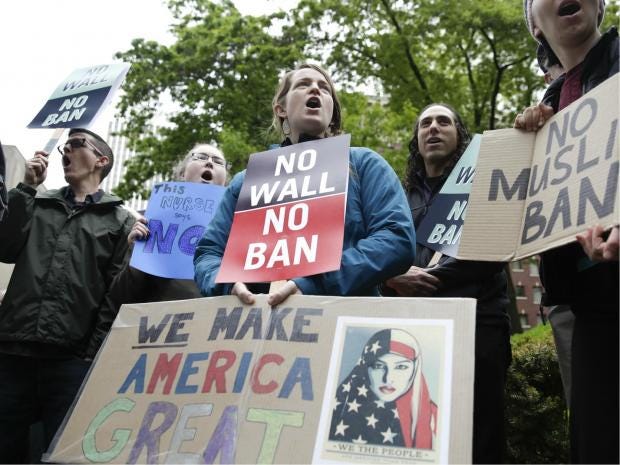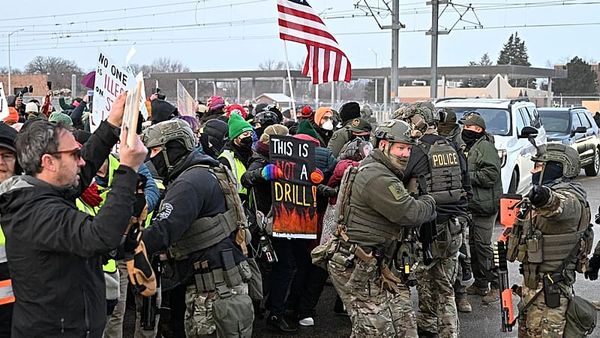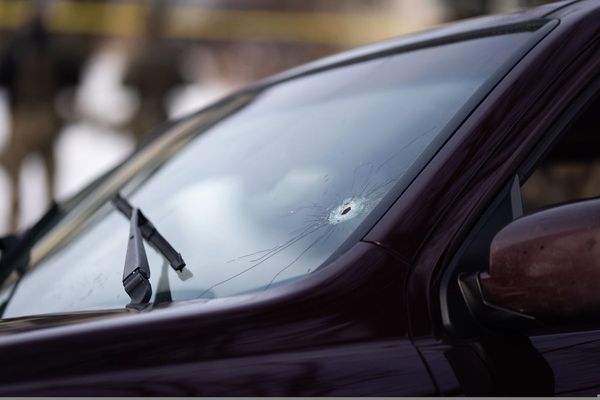
President Donald Trump’s controversial travel ban is set to go forward after the Supreme Court ruled this week in favour of the beleaguered measure.
The ban’s legal future remains a little unclear, however, as two US appeals courts are set to hear arguments against the ban, which is the third of its kind proposed by Mr Trump.
Just two Supreme Court justices voted against allowing the travel ban to go through. Liberal Justices Ruth Bader Ginsberg and Sonia Sotomayor were the two hold-outs on the nine-judge panel.
What is in the ban?
Mr Trump’s latest ban targets travellers from Chad, Iran, Libya, Somalia, Syria, and Yemen. It restricts admission into the US from those countries unless the individual travelling can prove they have a “bona fide” relationship with someone in the United States.
The bans have all included restrictive language on refugee admission as well, and have resulted in significant cuts to those programmes this year.
What is the argument against the ban?
Last year, while Mr Trump was campaigning to become president, he repeatedly called for what he then described as a ban on Muslim people from coming into the US. Since the countries targeted by the travel ban are predominantly Muslim, lower courts have frequently ruled that the ban was intended to persecute members of a particular religion instead of for national security.
The Trump administration has argued in the courts that the President has a de facto concern with national security – and the Supreme Court has ruled in favour of a previous ban with that responsibility in mind.
What’s next for the travel ban?
While the Supreme Court ruled in favour of full implementation of the ban, it recognised that there are other challenges pending in lower courts as well.
The San Francisco-based 9th Circuit Court of Appeals and the 4th US Circuit Court of Appeals in Richmond, Virginia, are both planning to hear arguments regarding the ban’s legality this week. Those cases will then be heard by the Supreme Court.
What has happened to the previous travel bans?
The ban that the Supreme Court upheld Monday is the third iteration of the policy that the President has authorised, and is the second to be green lit by the Supreme Court.
The very first of those bans was signed in the early days of the Trump presidency, and was quickly met with fierce opposition from protesters and lawyers upset by the chaotic scene that the hastily implemented ban had. Federal judges later blocked the ban, and the Trump administration later dropped that version of the ban altogether.
The second draft to the executive order was a bit smoother. Mr Trump signed the executive order in March, and gave advance warning for its implementation. Just before it was to go into effect, however, a federal judge blocked its implementation.
From there, the ban made its way to the Supreme Court, where the justices deferred to the administration and its claims that it requires leeway to keep the country safe.
The new version of the bill was drafted to be implemented after that ban expired.
What will the Supreme Court decide when the other challenges are considered?
While it’s impossible to say what the justices will ultimately decide, legal experts have said that their Monday ruling indicates that they are likely to rule in favour of the administration. The court has a long history of siding with the executive branch when it comes to measures concerning national security.
What has the reaction been?
The Trump administration was predictably happy with the Supreme Court’s decision, while civil rights groups expressed outrage.
US Attorney General Jeff Sessions said that the ruling was “a substantial victory for the safety and security of the American people”. Meanwhile, White House spokesperson Hogan Gidley said the West Wing was “not surprised” by the decision.
The American Civil Liberties Union (ACLU) released a statement following the decision calling the President a bigot.
“President Trump’s anti-Muslim prejudice is no secret – he has repeatedly confirmed it, including just last week on Twitter. It’s unfortunate that the full ban can move forward for now, but this order does not address the merits of our claims. We continue to stand for freedom, equality, and for those who are unfairly being separated from their loved ones. We will be arguing Friday in the Fourth Circuit that the ban should ultimately be struck down,” Omar Jadwat, the director of the ACLU’s Immigrants’ Rights Project, said.







